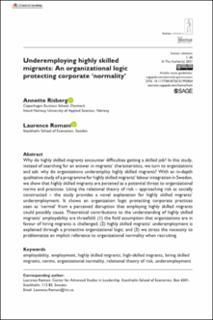| dc.contributor.author | Risberg, Annette | |
| dc.contributor.author | Romani, Laurence | |
| dc.date.accessioned | 2021-09-30T12:26:29Z | |
| dc.date.available | 2021-09-30T12:26:29Z | |
| dc.date.created | 2021-02-23T09:43:28Z | |
| dc.date.issued | 2021 | |
| dc.identifier.issn | 0018-7267 | |
| dc.identifier.uri | https://hdl.handle.net/11250/2786660 | |
| dc.description.abstract | Why do highly skilled migrants encounter difficulties getting a skilled job? In this study, instead of searching for an answer in migrants’ characteristics, we turn to organizations and ask: why do organizations underemploy highly skilled migrants? With an in-depth qualitative study of a programme for highly skilled migrants’ labour integration in Sweden, we show that highly skilled migrants are perceived as a potential threat to organizational norms and practices. Using the relational theory of risk – approaching risk as socially constructed – the study provides a novel explanation for highly skilled migrants’ underemployment. It shows an organization logic protecting corporate practices seen as ‘normal’ from a perceived disruption that employing highly skilled migrants could possibly cause. Theoretical contributions to the understanding of highly skilled migrants’ employability are threefold: (1) the field assumption that organizations are in favour of hiring migrants is challenged; (2) highly skilled migrants’ underemployment is explained through a protective organizational logic; and (3) we stress the necessity to problematize an implicit reference to organizational normality when recruiting. | en_US |
| dc.language.iso | eng | en_US |
| dc.rights | Navngivelse 4.0 Internasjonal | * |
| dc.rights.uri | http://creativecommons.org/licenses/by/4.0/deed.no | * |
| dc.title | Underemploying highly skilled migrants: An organizational logic protecting corporate ‘normality’ | en_US |
| dc.type | Peer reviewed | en_US |
| dc.type | Journal article | en_US |
| dc.description.version | publishedVersion | en_US |
| dc.source.journal | Human Relations | en_US |
| dc.identifier.doi | 10.1177/0018726721992854 | |
| dc.identifier.cristin | 1892632 | |
| cristin.ispublished | true | |
| cristin.fulltext | original | |
| cristin.qualitycode | 2 | |

